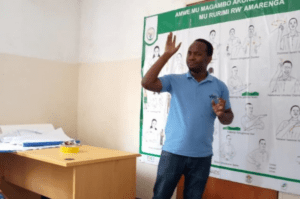In the series ‘Our Year in Stories’, we highlight several stories from our 2020/2021 Annual Report. This time we highlight the story of changemaker Eric Ngabonziza. Together with other changemakers, he made sure that 279 deaf adolescents in Rwanda received life-saving information about COVID-19.
 Eric
Eric
The first case of COVID-19 in Rwanda was recorded on 14 March 2020. Seven days later, the government imposed a full national lockdown. The disadvantages faced by marginalised groups, including people with disabilities have only been heightened by the pandemic. VSO national volunteers in Rwanda have been working to overcome the specific challenges faced by the deaf community.
The communication channels used to convey safety information to most Rwandan citizens are often inaccessible for deaf people who cannot hear radio broadcasts or television programmes. In response, VSO national volunteers, Community Health Workers and National Youth Council representatives collaborated on socially distanced, door-to-door home visits to people with hearing impairments. They reached 297 deaf adolescents who were at risk of not receiving essential safety messaging.
Eric, a VSO national deaf volunteer, worked alongside other national volunteers, the RNUD (Rwanda National Union of the Deaf) and partners to develop sign language videos broadcast over television and social media. The videos provided life-saving information based on official messages from the World Health Organisation and the Rwandan Government. Over 600 deaf people re-tweeted the video messages and an estimated 134,000 viewers from the general population viewed further messages broadcast on television.
Eric says, “For deaf people, the project has helped us access information about COVID-19 and how we should protect ourselves. It’s created awareness about the rights of deaf people during this time… We feel safe and are being careful to wear masks and wash our hands … many deaf people are not able to access information on radio or TV, so they are left behind. We’re able to ensure that the messages reach many people.”
Interested in the video’s of the RNUD? You can find them on their website or via Youtube.
